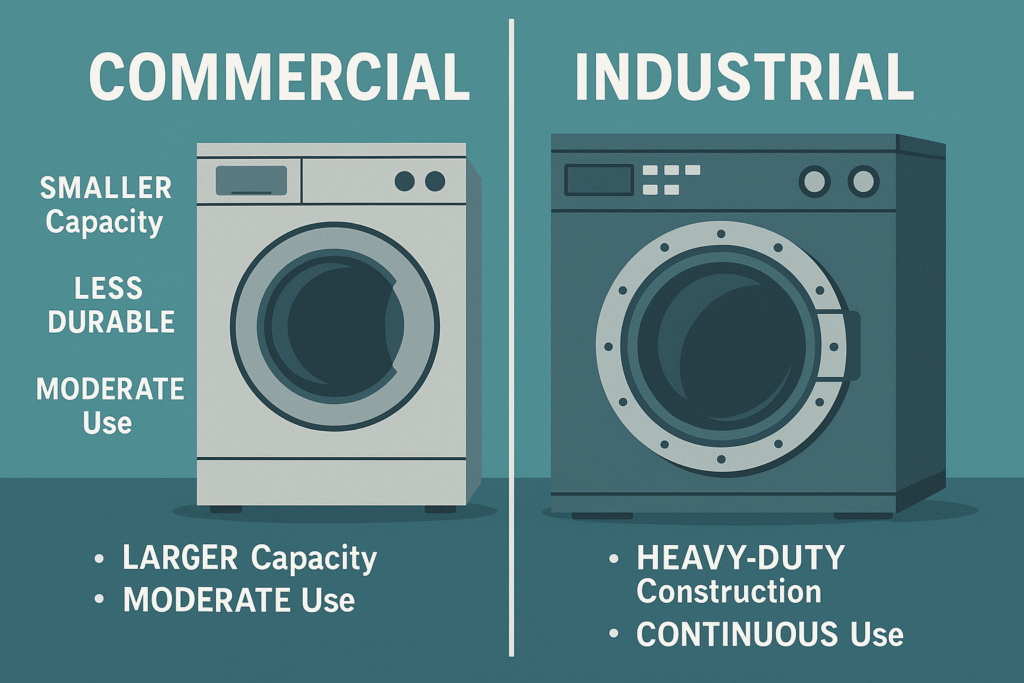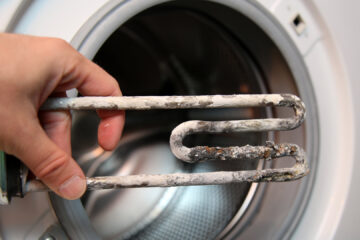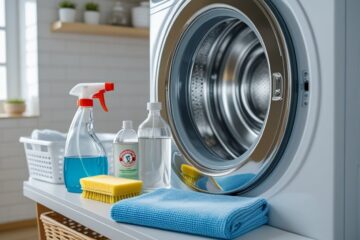What Is an Industrial Washing Machine?

An industrial washing machine handles way bigger, heavier loads than your average household or even most commercial washers. These units are tough, built for constant use, and really shine in places where laundry never seems to stop piling up.
Differences Between Commercial and Industrial Models
Industrial washing machines and commercial washers both outpace household machines, but they’re not quite the same. The main differences? Size, strength, and how much work you can throw at them.
Industrial washing machines can tackle massive loads—think the kind that’d take several cycles in a commercial washer. You’ll find heavy-duty parts inside, so they don’t break down even if they’re running non-stop. In places like hospitals or big factories, these things often run all day, processing hundreds of pounds in just one go.
Commercial washers are more for
Troubleshooting Common Issues
Unusual noises, leaks, or error codes usually mean something’s up. If you hear thumping or banging, stop and check for unbalanced loads or loose items.
Tighten or adjust parts as needed. If water’s leaking, check the hoses and door seal.
Replace any damaged parts you find. For error codes, grab your user manual for a quick fix or just try restarting the machine.
Always unplug the machine before you do any service, and follow basic safety steps. If you spot damage you can’t handle, it’s time to call a professional technician.
Compliance and Safety Standards
Industrial washing machines have to meet strict rules for safety and performance. Following these standards helps reduce risks, protect workers, and dodge fines.
Industrial Washing Machine Regulations
You need to follow regulations for machine safety, installation, and operation. For example, OSHA requires each unit to have a way to hold open the doors or covers during loading and unloading to prevent accidents and injuries.
Check out these OSHA laundry machinery regulations for more info. International safety standards, like those from the ISO for industrial laundry machinery, cover all major hazards.
These standards address things like emergency stops, secure water and electrical connections, and the right safety signs.
Key requirements include:
- Proper installation by licensed professionals.
- Compliance with local electrical and plumbing codes.
- Clear safety instructions and warning labels.
- Emergency shutdown systems.
Cost Considerations and Purchasing Tips
Industrial washing machines can be a big upfront investment. But you should also think about ongoing costs, long-term value, and after-sales support.
Stuff like total price, maintenance, and service contracts should factor into your decision. When looking at commercial-grade washers, the price can swing a lot based on size, brand, and features.
Long-Term Value Assessment
Most new units cost between $2,000 and $4,500 for washers, with some fancy models costing even more. You can check recent costs for commercial washers if you want to budget better.
Try to think past the sticker price. A machine that uses less water and energy will save you plenty over the years.
Reliable machines with solid construction might cost more upfront, but they usually break down less and last longer. Important factors to compare:
- Energy and water efficiency
- Maintenance and repair frequency
- Availability of spare parts
- Capacity needs versus future growth
Review each feature carefully. Sometimes spending more at the start means fewer headaches (and bills) down the road.
Warranty and Service Agreements
Always check the warranty details before you buy any commercial-grade washer. A good warranty usually covers the machine for at least a year, but some brands go up to three years or more for certain parts or repairs.
Service agreements can be a lifesaver too. Lots of suppliers offer maintenance plans that include routine checks and discounted parts.
This keeps machines running smoothly and can help extend their lifespan. Look for a warranty and service plan that fits your workload.
Read all the terms, ask about what’s included, and get details on repair response times and what isn’t covered. Knowing this stuff helps you avoid surprise costs.
Frequently Asked Questions
Industrial washing machines are made for heavy use, bigger loads, and better durability. They come with different features and options to suit commercial needs.
What factors contribute to the cost of industrial washing machines?
The price depends on the machine’s capacity, build quality, expected life, and the tech inside. Machines with features like automatic detergent injection or energy-saving modes usually cost more.
The mounting type also affects price; hard mount machines are typically about 25% less expensive than soft mount machines, according to Carolina Laundry Equipment.
What advantages do industrial washing machines offer over residential models?
Industrial machines are built for large loads and frequent use. They usually have stronger parts and more durable motors.
These washers tend to last longer and need less maintenance than home units. They’re also designed to clean more efficiently and tackle tough stains you see in commercial places.
Where can one purchase industrial washing machines?
You can buy industrial washing machines from commercial laundry suppliers, equipment dealers, or directly from manufacturers. Many dealers sell both new and used options.
Some suppliers have online stores and offer delivery, installation, and support. It’s worth shopping around for the best fit.
Which brand is recommended for heavy-duty commercial washers?
Brands like Speed Queen and LG are known for reliability and durability in busy settings. Speed Queen, for example, is a favorite for laundromats, hotels, and other businesses that need machines that can take a beating.
What considerations should be made when selecting a commercial washer and dryer?
Think about capacity, efficiency, durability, and features. Check how easy the machine is to maintain and repair, and see if local support is available.
Look for features like automatic soap dosing (found in some LG commercial machines)—it can save time and cut down on waste. Don’t forget to consider your future needs too.
How do Speed Queen commercial washers compare to other brands?
Speed Queen has built a reputation for tough construction and impressive durability. These washers can handle lots of cycles every day, which makes them a go-to for laundromats and other commercial spots.
Some brands offer more high-tech features, but honestly, Speed Queen wins people over with their reliability and how simple they are to service. If you want something that just works, they’re hard to beat.


